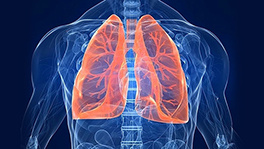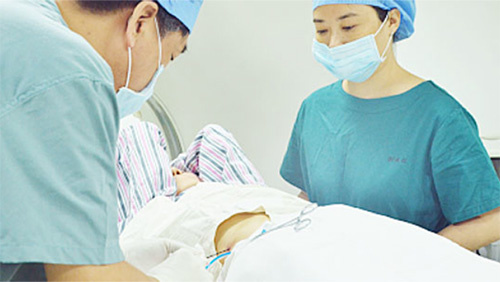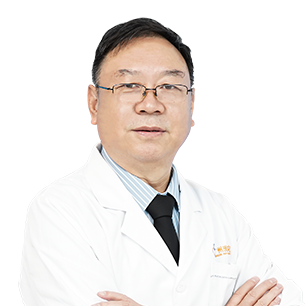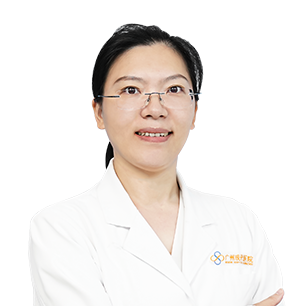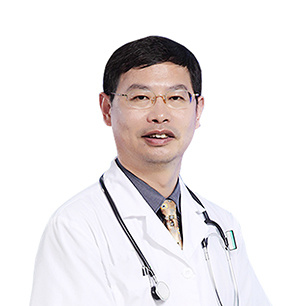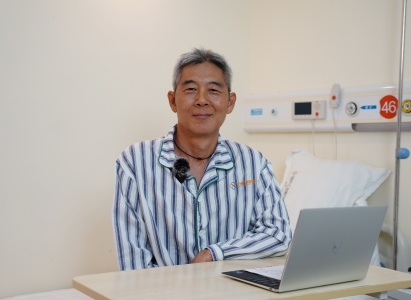Treating esophageal cancer in St. Stamford Modern Cancer Hospital Guangzhou
In St. Stamford Modern Cancer Hospital Guangzhou, we provide esophageal cancer patients with 18 advanced anticancer technologies and high quality services, and we will try our best to help them improve their living quality, relieve their pain and prolong their survival time. The MDT (Multidisciplinary Team) of St. Stamford Modern Cancer Hospital Guangzhou will make therapeutic plan for esophageal cancer patients based on their condition. Combining minimally invasive therapies with historic traditional Chinese medicine, esophageal cancer patients can avoid the suffering of traditional operation, chemotherapy and radiotherapy. Meanwhile, experts will monitor the whole treatment, and adjust timely to improve the efficacy.
If you are diagnosed with cancer, please consult online doctors for more information.
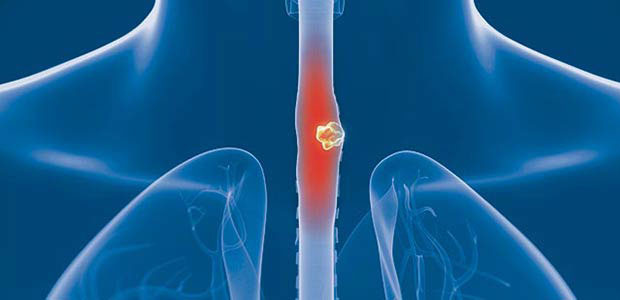
What is esophageal cancer?
Esophageal cancer is kind of malignant lesion in the esophagus. It is one of the most common malignant tumors of the digestive system, which can easily invade into the whole body and spread to any other parts of the body in advanced stage.
Esophageal cancer can be divided into four types:
The most common one is squamous cell carcinoma which amounts for over 90%. The cancerous change and metastasis process of this type last very long.
Other types such as adenocarcinoma of esophagus, small cell undifferentiated carcinoma, carcinosarcoma, which are rarely seen, but have high potential for aggravation.
There are about 300 thousands of people died of esophageal cancer each year, among which, the incidence of male is significantly higher than that of female with a proportion rate of 1.1-17:1. And the incidence is increasing as age goes by (especially after 35 years old). People among 60-69 years old are in high potential for esophageal cancer.
Even looks terrible, people should not be over worried. Paying attention to early symptoms can help to detect early stage esophageal cancer in timely manner and treat it effectively with advanced technology.
If you are diagnosed with cancer, please consult online doctors for more information.
What can cause esophageal cancer?
The presence of esophageal cancer combines complicated mixed factors like living habits, physical condition, inherent gene, microelements influence etc. And some believe the prime culprit may go to long term unhealthy living habits or diet habit.
What are the symptoms of esophageal cancer?
Early symptoms of esophageal cancer are not obvious. Nearly half of the esophageal cancer patients have found metastatic cancer when they were diagnosed. And the survival rate after surgery is only 25-40%.Therefore, knowing well of esophageal cancer is helpful for early detection and survival rate improvements.
The followings are some signs of esophageal cancer:
Foreign substance sensation in the esophagus, choking sense when swallowing;
Burning, needling or dragging sensation of chest bone when swallowing;
Impossible feeding (not able to eat) and companied with vomiting, upper abdominal pain, weight loss;
Obvious malnutrition, cachexia etc.
To one’s attention, the above-mentioned symptoms are not only for esophageal cancer, and may also refer to other diseases. No matter what situation it is, go to standardized hospital for related examination and diagnosis.
If you are diagnosed with cancer, please consult online doctors for more information.
What methods can be applied for diagnosis?
Fiberendoscopy: it is widely used for examining digestive tract disease;
Digestive tract endoscopic ultrasonography: it can detect the depth of the lesion’s invading extent to the esophageal wall; measure the abnormally enlarged lymph node outside esophageal wall etc.
X-ray barium meal examination: it can detect the lesion position, the length and the obstruction condition; meanwhile, it can also confirm if cancer cells have invaded outward of the esophagus or not;
CT examination: CT scan can clearly indicate the relation between the esophagus and adjacent mediastinum, but it can hardly detect early esophageal cancer. Combining CT with X-ray examination is very helpful for diagnosing esophageal cancer.
Esophageal exfoliative cytology examination:easy and convenient, causing little pain, it is the prime method for the diagnosis of esophageal cancer.
Stages of esophageal cancer
Stage 0: early stage esophageal cancer, it is also called primary esophageal cancer whose cancer cell is just limited to esophageal cuticular layer, without any malignancy changes or invasion to other lymph nodes and organs; so the other surrounding tissues are still normal, in this stage.
Stage I: malignant cells have already invaded into other tissues underneath the cuticular layer. It emerged in the lamina propia or mucous membrane substratum, but had not invaded into the muscle layer yet. Cancer cells won’t spread to lymph node or other organ in this stage, either;
Stage II: cancer cells have invaded into lymph nodes but not into other distant organs;
Stage III:esophageal cancer has invaded to the adjacent tracheas but still no distant metastasis occurs;
Stage IV: esophageal cancer has transferred to many other distant organs through blood circulation, like liver, bone, or even head.
If you are diagnosed with cancer, please consult online doctors for more information.
What are the treatments?
The stages and the patient’s individual condition play a role on treatment methods and purposes. Treatments for early stage esophageal cancer is to control the cancer, try to make it clinically disappeared and prolong life. For advanced stage, treatment will be made to control the patient’s condition, prevent the recurrence and improve life quality. Treatment items can be chosen alone or integrated based on per patient.
Surgery: with obviously therapeutic effect for early stage of esophageal cancer, it can remove the tissue, comprising the tumor and its adjacent lymph nodes.
Pathological staging is the most important prognosis factor for esophageal cancer patients. For Stage I, there is a 80-90% survival rate for 5 years survival time after surgery, while there is no more than 15% of 5 years survival rate for those patients whose partial tumor local area have reach advanced stage (Stage III or IV).
Radiotherapy: it applies radioactive ray to shrink the tumor before surgery or eliminate residual cancer cells after surgery. If patients are not suitable for surgery, radiotherapy can be chosen as an alternative option for surgery, too.
Chemotherapy: chemotherapy can be combined with radiotherapy to eliminate cancer cells. Though with good treatment effects, it has certain side effects to the body. Interventional chemotherapy is one of the chemotherapies. With this approach, chemo drugs are infused through esophageal cancer artery, making the cancer cells killed and leaves fewer side effects. Or chemo-embolism is usually applied, too.
Photodynamic treatment: in recent years, new photosensitizer and endoscope technology have further improved photodynamic therapy, and made it a commonly used rescue therapy after first-line therapy.
TCM can also be provided.
After multiple years of research and development, TCM have the function of regulating equilibrium and strengthening body resistance to fight against cancer. If TCM is combined with western medicine, the therapeutic effect shall be greatly improved. Combining TCM with surgery, radiotherapy, chemotherapy, etc. can effectively reduce the toxic reaction, improve patients’ immunity and body resistance to fight cancer, and further improve patients’ living quality, prolong survival period.
If you are diagnosed with cancer, please consult online doctors for more information.






